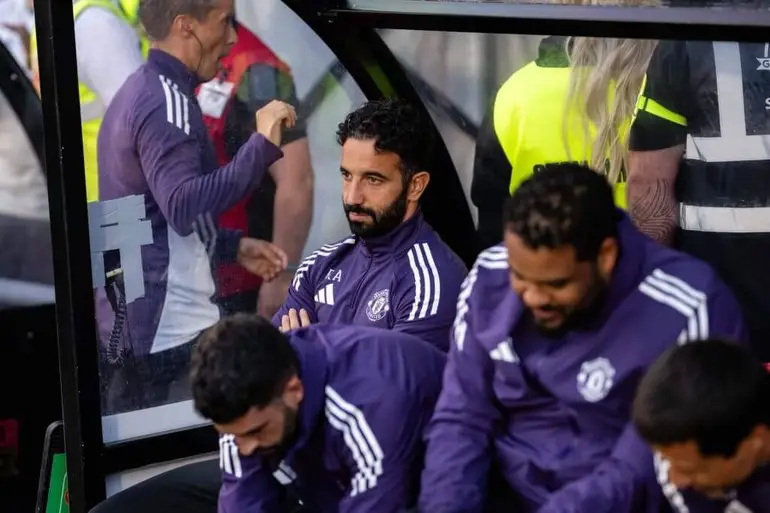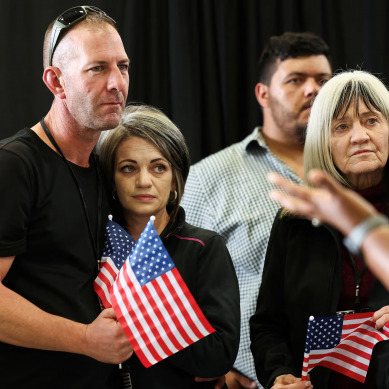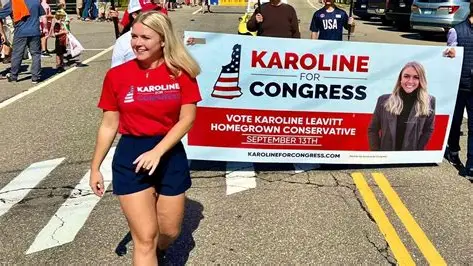
As the quiz question goes, “Which is the only team which plays every match away from home?”
Grimsby Town Football Club are not even located in Grimsby. Their ground is in Cleethorpes, the seaside town next to the fish docks of Grimsby in North East Lincolnshire, halfway up England’s east coast.
It’s a quirk that sums up this football club, my football club; the League Two club who knocked Manchester United of the Premier League out of the Carabao Cup in such dizzying, dramatic fashion on Wednesday night.
We literally have the word ‘grim’ in our name, we wear black and white stripes (“Oooh it’s just like watching Juventus”), carry inflatable fish (that’s Harry the Haddock, by the way) and sing incessantly about the industry that once made Grimsby the world’s largest port (“yes we do, yes we do”). The chant “all Town aren’t we” is not a question. It’s a statement, maybe even a state of mind sometimes.
You could hear it from the supporters at Blundell Park when the world’s most famous football team rolled into town, all smiles and anthem jackets, lolling around on the grass before kick-off. “We have smaller teams in Portugal too,” said Man United head coach Ruben Amorim in his pre-match interview with ITV, which showed the game live on free-to-air television in the UK. Not like this, you don’t.
The players were so close together in the tunnel that the officials had to sidestep their way between them. The main stand, where the dugouts are, still retains features dating back to 1901. The fans in the Pontoon, the stand behind the goal where the penalty shootout happened, can lean over the advertising hoardings and hammer on them. To say the away dressing room is compact would be an understatement.
Town’s ground, built in 1899, is squeezed in between two rows of terraced houses, with the Humber Estuary behind it. They had to close the car park on Tuesday, all 20-odd spaces of it, to accommodate the TV companies’ outside-broadcast trucks.
Grimsby Town vs Manchester United, after all, was live on both ITV and subscription-service Sky Sports in the UK. And then it rained so intensely that the television pictures were briefly interrupted, particularly in the immediate vicinity of the stadium, and the ball occasionally got stuck on the pitch, as stodgy as a tub of mushy peas. Typical.
But no matter. Grimsby did just what Amorim and his little tactics board couldn’t and got up and at United, submitting the defence to aerial bombardment and inducing outright panic. A two-goal lead could (should?) easily have been 3-0, and they had the ball in the back of the net four times, with two goals disallowed, before the visitors woke up. Then, after United drew level in the last minute of the 90, the so-called ‘minnows’ took a breath and won 12-11 on penalties to create pure pandemonium.
Grimsby, though, have form for bringing bigger teams crashing down to earth.
My dad, my sister and I went to Anfield to watch them against Liverpool in the third round of the League Cup in October 2001. Phil Jevons popped up with the most unlikely 30-yard last-gasp winner and created bedlam in the away end. Twenty years ago, it was Tottenham Hotspur who slipped up in the same competition, at Blundell Park, thanks to a last-minute goal from Jean-Paul Kamudimba Kalala or JP Kalala as we called him.
In 2023, Grimsby reached the quarter-finals of the FA Cup, felling five teams from higher divisions on their way to a defeat at top-flight Brighton & Hove Albion. And on Wednesday, a squad costing less than £2 million, total, beat one from three tiers higher up who have spent more than £300 million trying to assemble a side.
If that doesn’t tell you about the hope and possibilities of the English football pyramid, nothing will.
We have yo-yoed up and down the divisions, crashing out of the Football League in 2010, then again in 2021. But we still used to take hundreds of fans, sometimes more than 1,000, to games in the non-League fifth tier of English football. Some of them even stayed off the pitch at the final whistle.
A new era began when local businessmen Jason Stockwood and Andrew Pettit took over in May 2021 and a proud football town got its club, its soul, back. Promotion to the Football League followed a year later. Under head coach David Artell, Grimsby are unbeaten in League Two this season after five games, having won three and drawn two.
Grimsby is not a place without its problems, far from it.
Last year, it was dubbed Britain’s “worklessness capital” after a documentary cited the high number of people claiming benefits. The less said about the 2016 Sacha Baron Cohen film titled Grimsby, the better.
The thing about Grimsby is you never pass through it. Geographically, it’s stuck out on its own. You have to drive down England’s most boring motorway, the M180, then suffer the grating concrete hell of the A180, or weave your way across the flat fields of Lincolnshire, or catch a train from Doncaster – like lots of Yorkshire folk have done over the years on a sunny day – to get there.
But it’s our place and Grimsby Town is our football club (even if, like me, you’re from the other side of the Humber – it’s a long story). There’s such pride in those distinctive black and white stripes, and no small amount of defiance either. We’re the Mariners, and “We only sing when we’re fishing”.
If you drive down Cleethorpes seafront, past the chip shops and the slot-machine arcades, the boating lake and the world’s smallest pub, turn left and then left again, you come to the Greenwich Meridian line. This is the point where east meets west; zero longitude. It is 2,517 miles to the North Pole and 9,919 miles to the South Pole, according to the sign.
There is a statue of a globe there too, with an inscription which says: “The World revolves around Cleethorpes.”
Well, the football world did on Wednesday night. And it was utterly marvellous.
- A Tell Media report / Adapted from The Athletic







